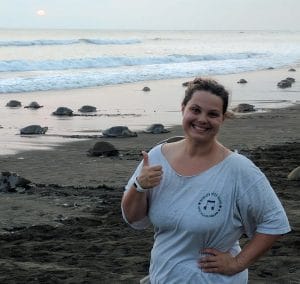Dr. Brie Myre, Hastings College assistant professor of biology, recently published an article in “Endangered Species Research,” a peer-reviewed scientific journal that focuses on research that assists with conserving endangered and threatened species.

Her article, “Anatomical Evidence that arribada olive ridley sea turtles Lepidochelys olivacea feed at breeding and nesting grounds to maintain high reproductive output,” appeared in the fall 2024 volume and is part of an ongoing research project.
You can read the open-access article at www.int-res.com/abstracts/esr/v55/p67-82.
In the article, Myre and colleagues focus on mass-nesting olive ridley sea turtles. During her dissertation research at Texas A&M University, Myre spent three summers measuring, taking blood and performing ultrasound examinations on mating and nesting sea turtles in Costa Rica.
“Olive ridley sea turtles show a lot of interesting differences in their behavior and life cycle from the other turtles in their family,” Myre said. “I was able to show that olive ridley sea turtles feed at their nesting grounds, when other species use stored fat to make their eggs. This is important because we need to manage food resources at nesting grounds for olive ridleys to lay the most possible eggs for species recovery.”
Myre grew up in Nebraska but said she always knew she wanted to work with sea turtles. She loves being able to share her passion for anatomy and physiology in her classes while showcasing her creativity in addressing important questions for the future of threatened species.
Hastings College is a four-year residential college that focuses on student academic and extracurricular achievement. Discover more at hastings.edu.

